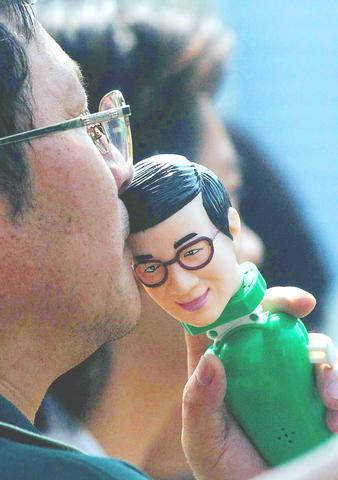President Chen Shui-bian (
"France is a problematic country," Chen told supporters at a rally in Taipei City's Neihu district.

PHOTO: CHIANG YING-YING, TAIPEI TIMES
"In order to sell arms to China, France took the lead among countries of the EU to lift the EU's arms embargo on China," he said.
"French President Jacques Chirac even spoke out against Taiwan's referendum and was willing to be used by China," Chen said.
Chen yesterday said China had conducted joint naval exercises with France off China's eastern coast in order to sway Taiwan's presidential election.
He urged voters to insist on the determination to walk "Taiwan's road paved with democracy, freedom and peace."
"Although China has said it has no interest in Taiwan's presidential election, we've seen it conduct a joint naval exercise with France. China even claimed that the exercise was unprecedented as it was the largest military exercise China had ever taken part in with a foreign country. The military exercise was aimed entirely at Taiwan's election," Chen said.
Chen urged the public to "walk a Taiwanese road, a democratic and free road" and to "dismiss China's military threat."
Chen said Taiwan's democratic road had been littered with obstacles.
"In 1996, China fired missiles into the Taiwan Strait to threaten Taiwanese voters, but former president Lee Teng-hui (李登輝) still took 54 percent of the vote and won the election. In 2000, China launched a war of words, threatening the voters with a war if they voted for me, but I still won the election.
"This year, China has used the same strategy. So, the people of Taiwan, you must still have faith in me, and we must not give in to China's threat," Chen said.
First lady Wu Shu-chen (吳淑珍) said Taiwan's referendum was the most important issue of the presidential election as far as the international community was concerned because it would signal a change to the military balance in the Strait.
"The referendum gives the people of Taiwan the power to stand up to China's military threat," Wu said.
Wu said China had announced that its military budget would increase by a double-digit figure, an announcement which led to a warning from the US that China not use force to affect the stability of the Strait. Japan and South Korea had also expressed concern regarding the growth of China's military buildup, Wu said.
Wu said she was more worried about the results of the referendum than about Chen's re-election.
"If Taiwan's referendum is not qualified, Taiwan will lose face in the international community," Wu said. "The international media will interpret the failed referendum as a debacle of Taiwanese people's solidarity. How could we persuade the world to help us if we even lost faith in ourselves?" Wu said.
The rally was one of two held in Taipei last night. The other was held in Panchiao. The DPP hopes to heat up election passions in the Taipei area, where the party still lags behind the pan-blue alliance.
Also See Story:
China accused of interfering in election

MAKING WAVES: China’s maritime militia could become a nontraditional threat in war, clogging up shipping lanes to prevent US or Japanese intervention, a report said About 1,900 Chinese ships flying flags of convenience and fishing vessels that participated in China’s military exercises around Taiwan last month and in January last year have been listed for monitoring, Coast Guard Administration (CGA) Deputy Director-General Hsieh Ching-chin (謝慶欽) said yesterday. Following amendments to the Commercial Port Act (商港法) and the Law of Ships (船舶法) last month, the CGA can designate possible berthing areas or deny ports of call for vessels suspected of loitering around areas where undersea cables can be accessed, Oceans Affairs Council Minister Kuan Bi-ling (管碧玲) said. The list of suspected ships, originally 300, had risen to about

DAREDEVIL: Honnold said it had always been a dream of his to climb Taipei 101, while a Netflix producer said the skyscraper was ‘a real icon of this country’ US climber Alex Honnold yesterday took on Taiwan’s tallest building, becoming the first person to scale Taipei 101 without a rope, harness or safety net. Hundreds of spectators gathered at the base of the 101-story skyscraper to watch Honnold, 40, embark on his daredevil feat, which was also broadcast live on Netflix. Dressed in a red T-shirt and yellow custom-made climbing shoes, Honnold swiftly moved up the southeast face of the glass and steel building. At one point, he stepped onto a platform midway up to wave down at fans and onlookers who were taking photos. People watching from inside

Japan’s strategic alliance with the US would collapse if Tokyo were to turn away from a conflict in Taiwan, Japanese Prime Minister Sanae Takaichi said yesterday, but distanced herself from previous comments that suggested a possible military response in such an event. Takaichi expressed her latest views on a nationally broadcast TV program late on Monday, where an opposition party leader criticized her for igniting tensions with China with the earlier remarks. Ties between Japan and China have sunk to the worst level in years after Takaichi said in November that a hypothetical Chinese attack on Taiwan could bring about a Japanese

The WHO ignored early COVID-19 warnings from Taiwan, US Deputy Secretary of Health and Human Services Jim O’Neill said on Friday, as part of justification for Washington withdrawing from the global health body. US Secretary of State Marco Rubio on Thursday said that the US was pulling out of the UN agency, as it failed to fulfill its responsibilities during the COVID-19 pandemic. The WHO “ignored early COVID warnings from Taiwan in 2019 by pretending Taiwan did not exist, O’Neill wrote on X on Friday, Taiwan time. “It ignored rigorous science and promoted lockdowns.” The US will “continue international coordination on infectious